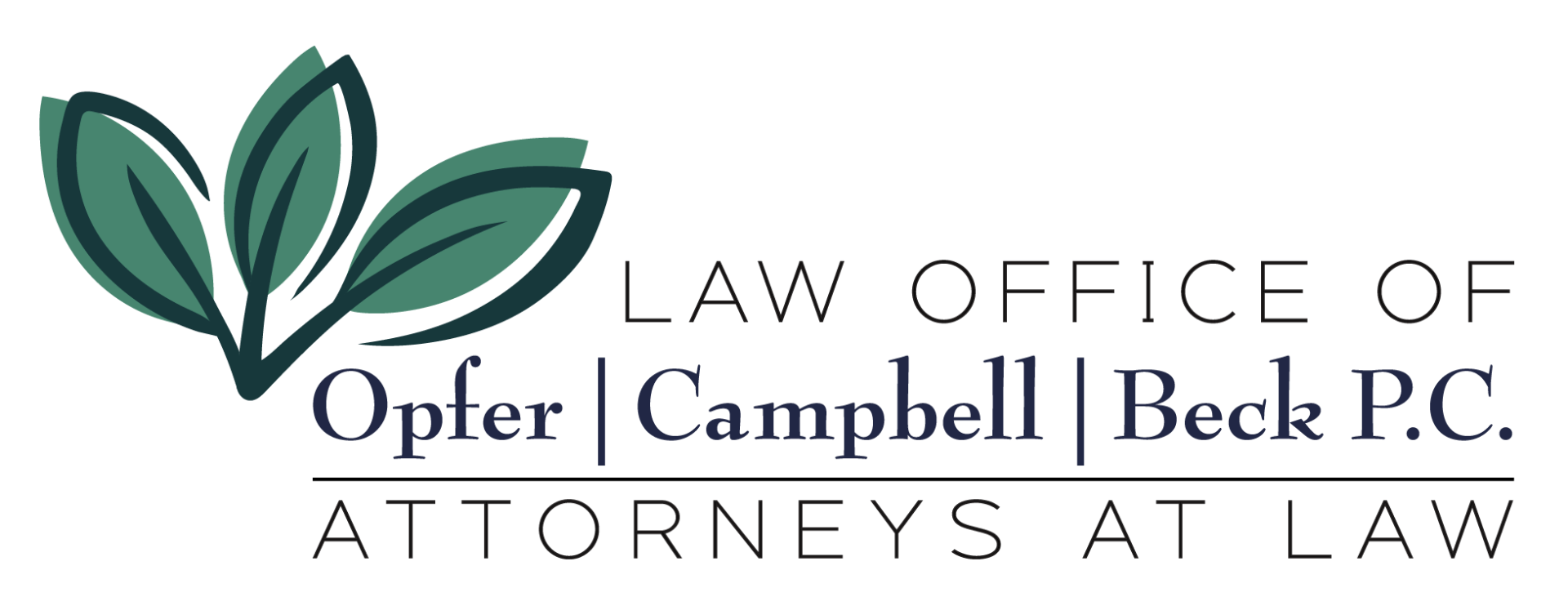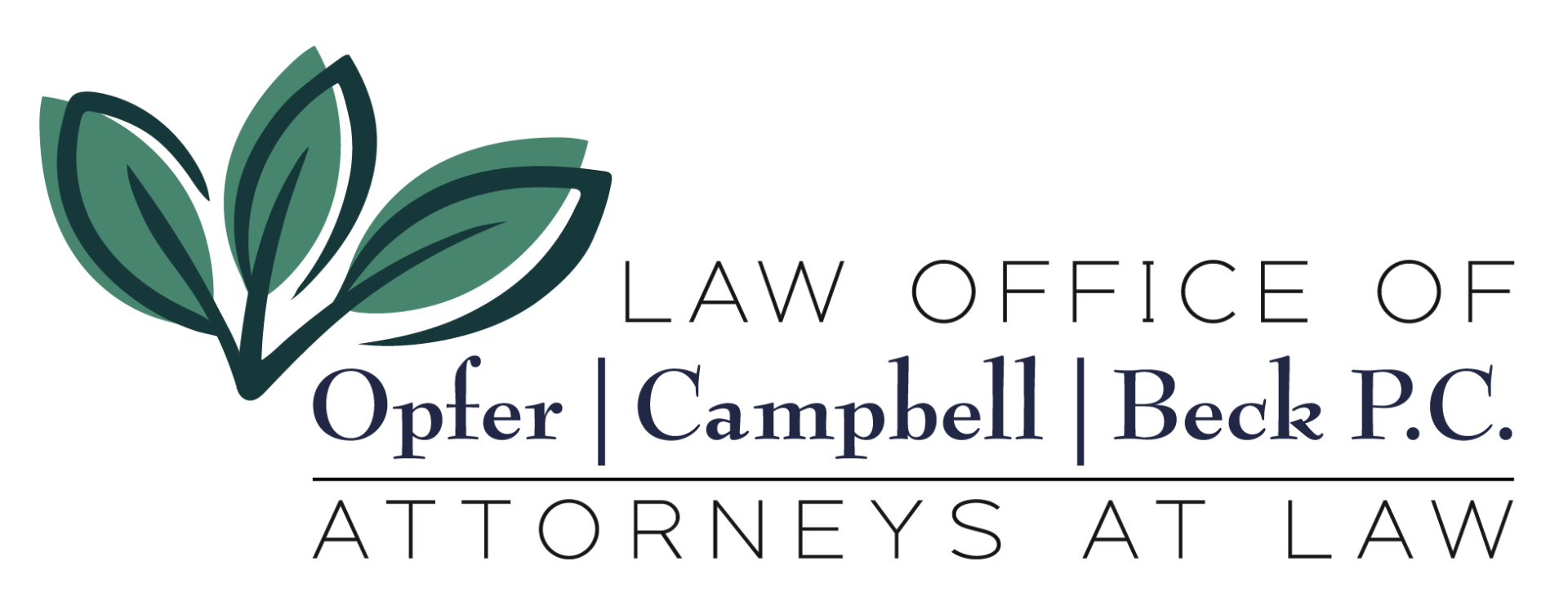Practice Areas
Estate Planning + Probate
Powers of Attorney, Wills, Trusts, Estate + Trust Administration, Guardianships, Conservatorships, and Elder Law
Estate Planning
Estate Planning, as a process, can be very daunting because most of us do not have any experience with these issues and do not know where to begin. At Opfer | Campbell | Beck P.C., we have a dedicated estate plan department and staff that will assist you with understanding the foundations of planning, your options for how to create and implement a plan, and we will continue to be a resource for you with maintaining that plan for years to come.
Every client and case has different needs, so to begin, we will always provide you with a complimentary hour of our time, and follow this with helpful resources, action items, and options for your planning. There are never any obligations or deadlines to hire us for planning services, but we will be a resource to you and your family to the extent possible.
The Last Will & Testament
A valid Will allows you to name the person (Executor / Personal Representative) to handle your affairs after you pass away. If you have minor children, the Will also allows you to nominate guardians to continue providing care. But above all, a Last Will serves as an instruction manual for inheritance, taxes, expenses, etc. The biggest and most difficult misconception, though, is the belief that a Will avoids probate. This is not true! A Will only works *if probate happens* and that usually is not what we want. Wills do still serve important functions, such as appointing guardians if you have minor children, but it is important to work with an estate attorney to understand how you might structure yourself to avoid probate and avoid having to use a Will in the first place.
Living Wills (Advance Medical Directives)
Also called "Advance Medical Directive" and “Declaration as to Medical Treatment,” the Living Will makes final wishes about life support now, so that your loved ones do not have to make these decisions for you later and at such a difficult time.
Powers of Attorney
Powers of Attorney authorize another person to step into your shoes and take over your affairs if you become "incapacitated," meaning when you lose the ability to make your own decisions. In the estate planning process, it is important to identify the most trusted people to make medical and non-medical decisions for you. Without valid Powers of Attorney, a person (even a spouse!) must be approved by a probate judge to help you, in proceedings we commonly call Guardianship and Conservatorship.
Trust Planning + Administration
Trusts are not just for the wealthy! Yes, trusts can address estate and gift tax issues when you have “too much money,” but the vast majority of people use trusts for other reasons. Trusts allow you to leave inheritance to young children who cannot manage it themselves, allow you to leave inheritance to disabled heirs (without causing them to lose important benefits, and allow you to create any amount of structure, management, and *protection* for the inheritance you leave behind.
The most common version is a “Revocable Living Trust.” Created by one person or a couple during their lifetime, the trust is “funded” with all their assets while alive, meaning we retitle everything into the trust so that it avoids probate in the future. The trust instructs about how inheritance is held, managed, and distributed when the creator(s) passes away. Living trusts offer maximum flexibility for planning, and a creator can revise the trust as many times as needed while they are still alive. After the creator passes away, Colorado allows a trust to exist and manage assets for up to 90 years! There are countless reasons to create a trust, and reasons people do not need one, but an estate planning specialist can help you understand if a trust would be right for you.
Serving as the Trustee, Trust Protector, or Beneficiary of a trust can be an extremely daunting endeavor. Trustees, and some Trust Protectors, are “fiduciaries” that have many legal requirements. Complying with all the “fiduciary duties” of a trust is a constant process. Trustees manage assets, make investment decisions, prepare accountings, make distributions, and deal with conflicts that arise between beneficiaries. All these tasks can overwhelm even the most well-prepared individuals. And trust Beneficiaries have their own legal rights, based on the interests left to them by the trust creator. In any role of a trust, you can engage legal representation, whether to assert your rights or just to ensure that administration is on the right track. An experienced attorney can help trust administration begin correctly, and avoid probate litigation proceedings later on.
What is Probate?
Across America, we hear horror stories of “probate” as lengthy, expensive, complicated, and full of conflict. Every state has a different set of rules for probate, but rest assured that probate in Colorado can be a smooth process.
Even a well-crafted estate plan can find its way to probate. This happens because of the way you titled your assets (e.g. house, cars) at the time of death. And even with documents like a Last Will, you must take extra steps to avoid court proceedings (**because a Will does not avoid probate on its own - contact us for a discussion about estate planning!).
Importantly, Colorado has a very effective, streamlined system for probate matters. Depending on the legal issues at hand, the process may only take weeks or months to complete. Unfortunately, probate cases open the door for fights between the different parties involved. Even with the best intentions, any interested person may challenge something happening in probate. The resulting litigation can last for years and cost substantial amounts. So although probate is not as daunting in Colorado, it is still an involved process with many requirements.
What is Probate?
After the death of a loved one, the very last thing we want to deal with is going through probate. However, the majority of people will not take steps needed to avoid probate, or an issue or conflict might force us through probate even with a proper estate plan. Although Colorado is one of the best states for addressing probate, it is still a lengthy process full of filings, deadlines, and other complexities. There are two primary types of probate estates in Colorado ("formal" vs. "informal"), and then probate is complicated even more based on whether the person who died left a Will ("intestate" vs. "testate"). Whether you are, or want to be, the Executor / Personal Representative, or if you are an heir / beneficiary and just need to know your rights, an estate attorney exists to help you in these difficult situations.
Guardianships For Minors + Adults
The death, disability, or other loss of a loved one is extremely difficult time for anyone, but none more so than a child. While the adults scramble to pick up the pieces, they may forget the child left behind is experiencing endless difficulties. It is important to address the child’s needs quickly, which likely means pursuing a legal guardianship.
“Guardianship” is a probate action filed in the county where the child resides. By Colorado law, any person interested in the welfare of the child can petition appointment as the child’s guardian. If, however, a valid guardian nomination exists, the nominee receives top priority for appointment. A person can make nominations through documents such as a Last Will or General Power of Attorney. If the child is older than 12, they have a voice and can ask for a specific appointment. Once the probate judge finds that a certain person is best to take over care, it can appoint that person as Emergency (up to 60 days), Temporary (up to 6 months), or Permanent Guardian (until age 18). Afterwards, the guardian must file initial and annual reports until the guardianship terminates.
Similarly, when an adult becomes sick or disabled and can no longer make decisions for themselves, it creates a great strain on the family. When coupled with years of unresolved conflicts, this “incapacity” often results in children fighting over the best plan of care for their parent. The failure to reach agreement leads to fights over doctor appointments and medical procedures, housing arrangements, management of finances and property, and an overall lack of decision-making. These “protective proceedings,” also known as elder law proceedings, consist of Guardian (medical) and Conservator (financial) appointments for the adult. The cases are filed and managed in the county where this “Protected Person” resides. The proceedings grant court oversight and supervision for the Protected Person’s affairs, which has both benefits and drawbacks. Court supervision minimizes the risk that anyone can steal money, cut the person off from contact with family, etc. However, any major decisions, and most bill payments, require court approval, creating added delays and expenses in caring for the Protected Person.






